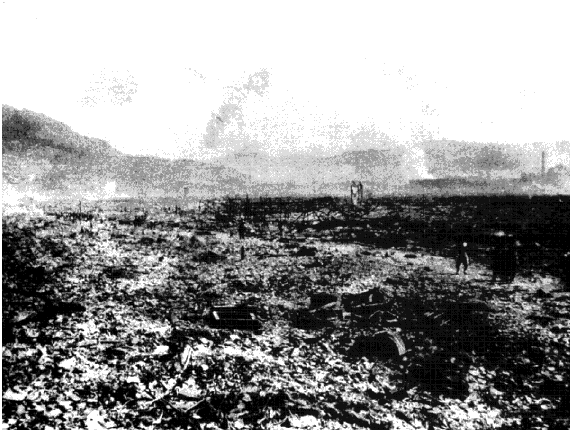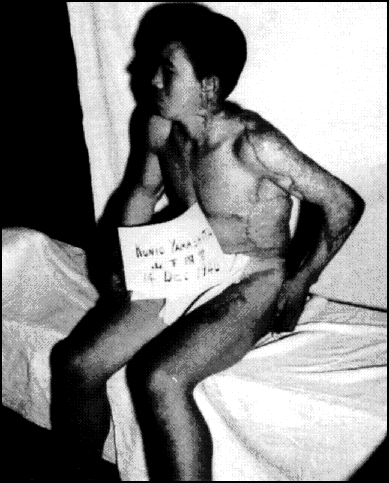The End of
The Imperial
Japanese Empire
Richard B. Frank
(Penguin)

Those who argue that American policy makers recognized that Japan was near surrender when they chose to unleash atomic weapons rest the core of their case on selected excerpts of these diplomatic exchanges [between Japan and the Soviets in the summer of 1945]. The first important defect with this critique is that it simply ignores the fact that there were two streams of decrypted Japanese messages. Military Ultra showed without exception Japan's armed forces girding for Armageddon. If, as American leaders correctly believed, the Imperial Army held the dominant position in Japan, then the Ultra reports carried an unmistakable political import...In face of this evidence, it is fantasy, not history, to believe the end of the war was at hand before the use of the atomic bomb.
We would also kneel on the ground and commit hari-kari. He explained to me that you took the knife and stuck it in the left side of your belly and pulled it all the way over to the right and then dragged it up to your heart and if you actually got up to your heart before you died this was something special in the Japanese culture. We then fell over and played dead and then got up and he would jump up in the air and cry, "Nagasaki" again. He now sells term-life for a living.
We knew that the Japs --- that was what we called them --- were a bad sort because we had heard that when they invaded China, they would take Chinese babies and throw them up in the air and catch them on their bayonets. After I grew up, I figured this was mere propaganda, but Richard Frank contends that the Japanese were truly brutish. We knew about the "Death March" at Bataan, and medical experiments they did on live patients. What we didn't know about was what they did to the Chinese and other Asians. In the occupied territories, the death rate for the nationals totaled some 100,000 a month --- through forced labor, starvation, and outright murder. That's 100,000 Asians dying, every month, for three or more years.
Our dropping the bombs on Nagasaki and Hiroshima, he tells us, not only brought the war to an end, it saved hundreds of thousands of lives in the occupied countries, and, ironically --- saved even more lives of the Japanese. For in the few days after they had declared war --- and in the following months of "peace," the Russians killed off 350,000 Japanese (mostly non-military). If the Russians had invaded the island of Hokkaido --- their contingent plan --- Frank claims that the Russians would have murdered everyone in sight.
Furthermore, if there had been an actual invasion of the islands of Japan, the number of Americans that would have died on Kyushu would have been enormous. The ratio of invaders to defenders was close to one-to-one. In addition, the Japanese authorities had told the people of the island that they were expected to form a civilian front, and to defend the military positions with their lives. Very few civilians defied the military.
Finally, the new policy of air suicide missions led experts to believe that the death toll would be extremely high. During the preparations for the defense of the home-islands of Japan, there had been intensive training of kamakazi pilots, their planes equipped with explosives set into the noses, and just enough fuel to get to their targets. These suicide missions, which began in earnest in the last eight months of the war, were a terror to the U. S. Navy: it's very difficult to blow an airplane out of the sky when it's filled with TNT and coming screaming down directly at you.
The peace negotiations in the last days of the war --- not only with the U. S. but within the Japanese high command --- were brief. The surprise is that they worked at all. The machinations that went on within the Japanese High Command and back and forth between the military and the Emperor (and his family) constitutes some of the best writing in Downfall. We found that it reads like a good mystery: you know how it's going to end, but the writing makes one temporarily forget the ultimate outcome. Suspension of belief, as it were.
The Japanese military were completely opposed to "unconditional surrender," a concept cooked up by FDR at Yalta. They knew what it meant, and it meant just that: the surrender would have to be total; the allies would be free to do whatever they wanted once they marched in. By contrast, the Japanese felt that if they could just get one big victory, that England, the US, and Russia would back off: allow a surrender with terms --- leave them to disarm themselves, leave the Emperor on the throne, and, naturally, not conduct any war crime trials. The American planners believed that if the Japanese military stayed in power, then peace in the Pacific could not be guaranteed in the future. The dropping of the atomic bombs changed all that.
The bomb itself came out of the blue. Japanese experiments had proved to them that it was impossible to construct such a device. Frank's description not only of Hiroshima and Nagasaki, but his careful limning of earlier fire-bombings (one that took place on the 10 March 1945 burned out fifteen square miles of Tokyo and cooked up 100,000 Japanese) tend to make one wonder about the degree of humanity that was supposed to reside with the Allies, and makes one wonder even more about that hoary Christian concept of "a just war."
Why were we so willing to burn up citizens: not only the military, but civilian men, women, young and old alike --- even children and babies? This came about, Frank contends, from our previous experiences in Europe:
The reasons for this massive application of aerial firepower were multiple and cumulative. The whole train of events was initiated by the wanton bombing of civilians by Axis nations, which first defied the attempt between the wars to proscribe indiscriminate bombing.
There was not only Guernica and Rotterdam, but the cruel "buzz" bombs and V-2s that rained down on England in the closing years of the war. Most of all, we forgot how close we came to losing on both fronts:
Allied leaders were seared by the knowledge of how near the Axis had come to triumph.
 Frank thinks that without Nagasaki and Hiroshima, not only Allied but the Japanese loss of life would have been horrendous. It was predicted that we would lose 250,000 on invasion, with another 750,000 casualties. It would have been equally catastrophic for Japanese citizens. During the war, Japan imported 95% of its foodstuffs by boat. We had managed to sink a greater portion of that fleet, in addition to destroying the railroads that delivered this matériel to the people. He estimates that by the end of 1945, there would have been a famine that might have turned the tide by starving millions --- not hundreds of thousands but millions --- of Japanese civilians.
Frank thinks that without Nagasaki and Hiroshima, not only Allied but the Japanese loss of life would have been horrendous. It was predicted that we would lose 250,000 on invasion, with another 750,000 casualties. It would have been equally catastrophic for Japanese citizens. During the war, Japan imported 95% of its foodstuffs by boat. We had managed to sink a greater portion of that fleet, in addition to destroying the railroads that delivered this matériel to the people. He estimates that by the end of 1945, there would have been a famine that might have turned the tide by starving millions --- not hundreds of thousands but millions --- of Japanese civilians.
The Imperial Army ran Japan. They were opposed to surrender in any form. However, one of their number happened to be in Hiroshima the day the bomb was dropped. His report to them was poignant and potent; it is said that he broke into tears. The Emperor --- who could easily have been overthrown by the military --- carried just enough weight to not only convince them to abandon their cause, but to convince other military outposts that they must obey and lay down their arms.
He was able to carry this out despite the fact that a few days one way or another might have seen his own life terminated by the more militant forces in the Imperial Army. It was a close call, and in this fine book, the story makes for excellent (and breathless) reading.